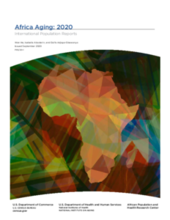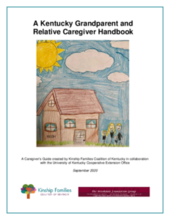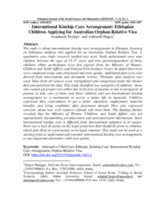Displaying 101 - 110 of 608
This study examined how custodial grandmothers navigated the process of their grandchildren being reunified with a biological parent.
This report illustrates current patterns and projected trends of population aging in Africa and empirical evidence of the socioeconomic circumstances and health status of older Africans. Among other findings, the report notes that older Africans, especially older women, play an active role of caregivers or guardians of younger-generation kin.
This handbook is meant as a reference guide to enlighten grandparents and relative caregivers on resources and information that may be available to them and their family.
This study examined the relationship between material hardship and parenting stress among grandparent kinship providers, and assessed grandparents’ mental health as a potential mediator to this relationship during the COVID-19 pandemic in the United States.
The purpose of this study was to determine whether group-based training improves foster carer self-efficacy.
This exploratory study provides early research to understand the relationship between levels of meaning-making and well-being in kinship caregivers.
The current study reexamined a kinship caregiver assessment using data from a study conducted at the Children and Family Research Center (CFRC).
This study is about international kinship care arrangements in Ethiopia, focusing on Ethiopian children who applied for an Australian Orphan Relative Visa.
This study selected children who remained in kinship care (N = 267) for three waves from nationally representative data and examined the longitudinal associations among poverty, economic pressure, financial assistance, and children’s behavioral health outcomes in kinship care.
This guidance from Miracle Foundation outlines case management process and tools aimed at children in Child Care Institutions (CCIs) in India who have been placed with their families during the COVID-19 pandemic. The purpose of these case management processes and tools is to determine feasibility of permanent placement and expedite family-based care in families in which children were placed quickly and without proper preparation during COVID-19 lockdown.




